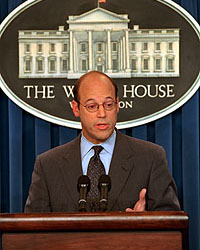A Quote by Michael J. Knowles
Republicans stalled Merrick Garland's nomination to the Supreme Court because they could, and 136 years of American history recommended it as politically advantageous.
Related Quotes
When President Donald Trump nominated Judge Neil Gorsuch to serve on the Supreme Court, I said that he deserved a fair hearing and a vote. I said this even though Senate Republicans filibustered dozens of President Obama's judicial nominees and then stopped President Obama's Supreme Court nominee, Judge Merrick Garland.
Class warfare always sounds good. Taking action against the rich and the powerful and making 'em pay for what they do, it always sounds good. But that's not the job of the Supreme Court. The Supreme Court standing on the side of the American people? The Supreme Court adjudicates the law. The Supreme Court determines the constitutionality of things and other things. The Supreme Court's gotten way out of focus, in my opinion.
In fact, Native American Rights Fund has a project called the Supreme Court Project. And quite frankly, it's focused on trying to keep cases out of the Supreme Court. This Supreme Court, Justice Roberts is actually, hard to believe, was probably worse than the Rehnquist Court. If you look at the few decisions that it's issued.
The notion that the Supreme Court comes up with the ruling and that automatically subjects the two other branches to following it defies everything there is about the three equal branches of government. The Supreme Court is not the supreme branch. And for God's sake, it isn't the Supreme Being. It is the Supreme Court.
The Supreme Court nominations [example]. I mean, the fact that Mitch McConnell, the leader of the Republicans, was able to just stop a nomination almost a year before the next election and really not pay a political price for it, that's a sign that the incentives for politicians in this town to be so sharply partisan have gotten so outta hand that we're weakening ourselves.
The historical resonances are sharp. [Louis] Brandeis is nominated on Jan. 28, 1916. Confirmed on June 1. Waits 125 days between nomination and confirmation, which remains an unbroken record, although Merrick Garland will surpass it in July, if my math is right. Anti-Semitism was definitely not the central reason for the opposition, which tended to focus more on his anti-corporate radicalism, but it was a theme.



































